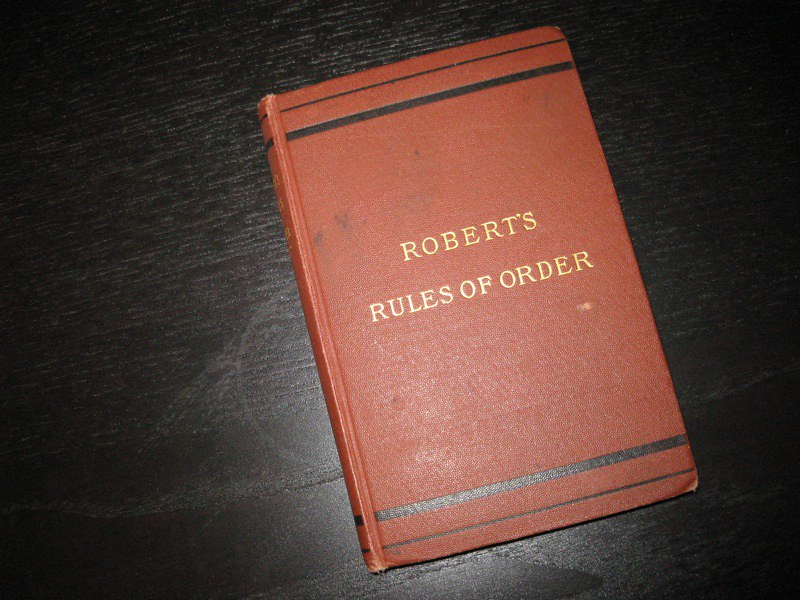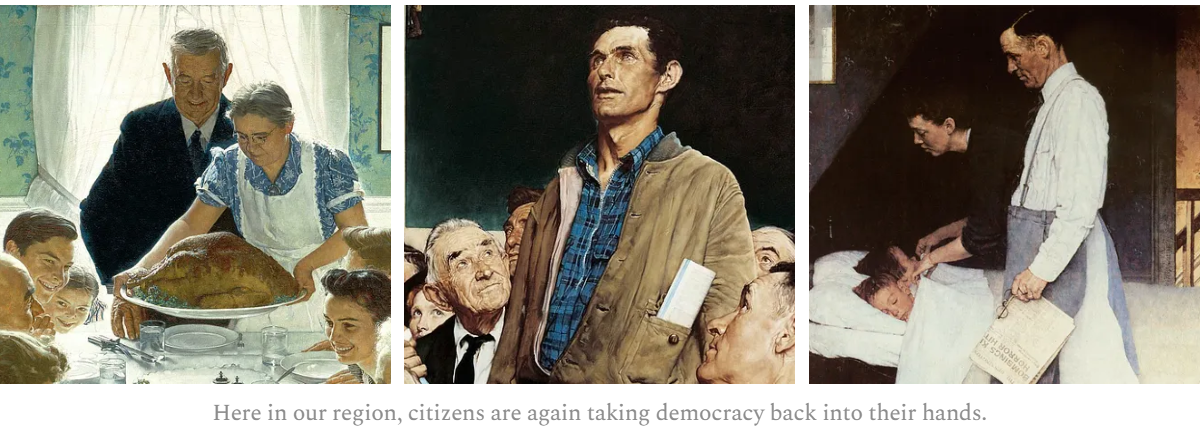
For three years, the School Board has not been following Robert’s Rules of Order; rather, members have bludgeoned one another with it. There’s a better way forward.
As has been the case for too many meetings of the Spotsylvania County School Board over the past three years, the gathering on Monday night, May 13, ended — predictably at this point — in insults and crosstalk and aggravations, with every side appealing to Robert’s Rules of Order to substantiate their actions.
This is a curiosity given that Robert’s Rules of Order is quite clear about the tone of such behavior.
4:30 “Debate must be confined to the merits of the pending question. Speakers must address their remarks to the chair, maintain a courteous tone, and—especially in reference to any divergence of opinion—avoid injecting a personal note into debate. To this end, they must never attack or make any allusion to the motives of members. As already noted, speakers should refer to officers only by title and should avoid the mention of other members’ names as much as possible.
(All citations, unless otherwise noted, are from Robert’s Rules of Order Newly Revised, 12th edition. PublicAffairs. Kindle Edition. Emphasis added.)
The chaos that continues forces people to ponder the possibilities that Robert’s Rules are either being used improperly, or that the rules themselves are insufficient to handle what is happening.
To gain some perspective on the deteriorating discourse on the Spotsylvania School Board, the Advance turned this week to the National Association of Parliamentarians and found John Tatum, a professional registered parliamentarian. In addition to serving as parliamentarian for organizations as diverse as The Maryland Board of Examiners in Optometry and the Washington Teachers Union, he has taught Parliamentary procedure at Trinity College in Washington, D.C.
We asked Tatum to review the meeting from May 13 — especially the final 30 minutes of that meeting — and offer some thoughts on what he observed. An edited version of that conversation follows.
Procedural Rules
The first concern that Tatum raised after watching the meeting was that “the procedural rules that [the Board is] breaking is what’s causing the chaos at the meetings. They’re stepping on the rules and … just go based on the history of how the Board has acted in previous years and previous meetings. They’re not trying to do things procedurally correct. They most likely don’t know the correct procedures.”
The clearest example of this is the simple act of seeking recognition.
There are several ways, Tatum notes, that this can be done. This Board, however, “isn’t using any of the standard ways.”
The simplest way to seek recognition is for a Board member to raise their hand and simply say: “I would like to be recognized,” and wait.
Instead, says Tatum, there were multiple incidents where people spoke out without first being recognized.
One example of this occurred at the 2 hour, 53 minute, and 30 second mark of the May 13 meeting when April Gillespie interrupted Lisa Phelps to ask for part of her time during committee reports. This led to a back-and-forth that was not resolved for another 10 minutes.
Per Robert’s Rules:
8. Interrupting a member. A member – who intends to make a motion or request that under the rules may interrupt a speaker shall use [the designated feature] for so indicating, and shall thereafter wait a reasonable time for the chair’s instructions before attempting to interrupt the speaker by voice.
There is a simple way to handle these disturbances, according to Tatum. The chair simply says that “You have not been recognized,” and then speak to who had the floor before the individual interrupted.
Should the person persist, the chair then says: “I’ve made my ruling; do you want to appeal my ruling?” If an appeal is requested, then a second person must agree to that appeal, and then each member is entitled to a comment of limited time on the ruling.
After all have spoken, a vote is taken. If the Board finds in favor of the chair, the dispute is over.
Another procedural error concerns the consent agenda. Tatum noted that members wanted to debate items on the consent agenda, which is not permitted. These are items that have already been debated and moved to consent.
“The only way to debate a consent agenda item,” Tatum said, “is to vote to take it off the consent agenda and put it on to New Business.”
Then there is the issue of how the minutes are handled.
“Minutes do not need to be voted on,” Tatum says. “They’re either perfect or require correction. If you correct them, then they are automatically approved.”
Point of Personal Privilege is another place where procedure is not being followed.
When a point of personal privilege is requested, the chair may rule on that point. Very rarely, however, does the chair have to make a ruling on a point of personal privilege.
Normally, the chair waits for the board members’ time to run out and then continues with the meeting without a comment, unless the members’ comments are out of order.
Another issue, notes Tatum, is the constant use of the expression “properly moved and seconded.” Instead of saying this, Tatum pointed out, the chair need only say: “It is moved and seconded.”
The use of the word “properly,” Tatum says, doesn’t fit in Roberts.
Managing the Meeting
The antics of both Phelps and Gillespie have rightly been flagged by the public as intentionally disruptive. A better mastery and application of Robert’s Rules of Order Newly Revised 12th edition should help to deal with these issues.
To that end, Tatum has some recommendations for the chair.
First, he recommends, handle “one thing at a time.” In other words, take care of the current item on the floor before bringing up another.
Second, Tatum recommends being mindful of time limits.
“Robert’s Rules says you can have the floor up to 10 minutes,” Tatum started, “which is entirely too long for all the organizations I’ve worked with. Three minutes is more common, and some limit it to two minutes.”
Third, on rollcall votes, Tatum suggests that once the majority number is reached to simply stop the vote. That is allowed by Robert’s Rules and is one small way to speed up meetings.
Fourth, all members need to understand that only the chair can make a ruling. “Lawyers and parliamentarians can only give an opinion,” Tatum said. “Rulings can only be given by the chair.” If members disagree with the ruling, then they can use the appeal to make their case.
Standing Firm on Egregious Actions
It’s important that the chair act swiftly on over-the-top comments, such as when Gillespie said to Daniels, “You’re being a Nazi.”
“At that point,” Tatum said, “the chair should have banged the gavel one time, and said: ‘Ms. Gillespie, you are out of order.’” At that point, Daniels should have quoted Robert’s Rules about speakers not speaking derogatorily about any of the Board members.
Should the abusive language continue, there are harsher actions that can be taken, including silencing the member for the duration of the meeting. However, that is an extreme step, Tatum notes, and potentially could be considered a violation of First Amendment rights. So, the chair would have to balance the First Amendment with Robert’s Rules in that case.
Robert’s Rules — Properly Applied — Can Restore Order
Voters, Board members, everyday citizens, even journalists who regularly watch these meetings can be led to believe that the situation in Spotsylvania is completely out of control with no hope of recovery.
However, Robert’s Rules of Order are specifically designed to handle such chaos in a way that balances everyone’s rights while maintaining order and moving through meetings in succinct, timely manners.
That’s something that everyone would like to see more often given how many times over the past three years meetings under the guidance of Kirk Twigg, then Lisa Phelps, and now Lorita Daniels have lasted well past midnight.
“The Board is doing so many things wrong,” Tatum says. “If they would adhere more to the procedural rules, the meetings would run much better.”

Local Obituaries
To view local obituaries or to send a note to family and loved ones, please visit our website at the link that follows.

Weather and Traffic

Support Award-winning, Locally Focused Journalism

The FXBG Advance cuts through the talking points to deliver both incisive and informative news about the issues, people, and organizations that daily affect your life. And we do it in a multi-partisan format that has no equal in this region. Over the past month, our reporting was:
$8 a month supports great journalism
- First to report Mary Washington Healthcare’s move to close Kid’s Station Daycare
- First to detail MWHC’s taking actions that undermine the viability of the Moss Free Clinic.
- First to detail and then expose the controversy surrounding the Riverbend High School swim team
- Providing the region’s best political coverage of the upcoming 7th District Congressional race.
For just $8 a month, you can help support top-flight journalism that puts people over policies.
Your contributions 100% support our journalists.
Help us as we continue to grow!




